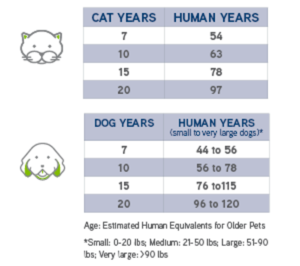
Support for Senior Dogs
Our dogs are living longer and longer, thanks to an improved diet, veterinary care, and other support. Linked with this, like humans, dogs experience more age-related conditions and challenges as they get older. And they might have a new set of needs to be content and happy senior dogs.
If your dog is six to seven years of age, it is considered being a senior pet (some breed differences), according to the American Veterinary Medical Association (AVMA).
 This is the equivalent of mid-40s for small to medium breeds and early 50s for large breeds.
This is the equivalent of mid-40s for small to medium breeds and early 50s for large breeds.
Refer to the AVMA table for more age information.
A lot of the same physical problems that humans experiences as we age, can be developed by our senior dogs: heart disease, diabetes, vision problems, and not to forget joint issues and weakness. You might also notice behavior changes such as confusion, increased barking, more anxiety, and changes in sleep cycles and house soiling.
Early detection is important and sometimes even crucial and therefore a two-yearly vet visit is recommended by the AVMA. The problems can be detected before they become life-threatening or potentially serious and improve the chances of a longer and healthier life for dogs.
During a thorough physical examination, the general condition can be checked and issues detected i.e. dental issues, dog’s teeth become more sensitive and prone to infection as they age, and infected teeth can increase the risks of heart disease and kidney disease. Therefore, dental care is very important. Professional dog dental cleaning is imperative if there are any infected or loose teeth. Those teeth are very painful, even though most dogs don’t show that they are undergoing pain. It will also help to reduce bacterial overload.
A common issue for dogs is osteoarthritis. If your dog is starting to avoid active playing or running or if he/she has trouble getting up, jumping on the favorite sofa, or into the car he/she may have arthritis. A dog with arthritis may also be more irritated, especially when petted, and may seem to be more depressed or grouchy. There may be other reasons for these changes too. An examination by our vets may determine the cause. There are several ways to support your dog: supplements, medication, and simple measurements like a soft bed or small steps near a bed. Read our previous blog on Arthritis in Dogs to learn more.
Like humans, some pets could lose sight and hearing as they age. Older pets may develop cataracts and may not respond well to voice commands. Dogs with poor sight or even being blind can get around well in familiar environments. If your dog’s eyesight is failing, avoid rearranging or adding items or furniture in your place that could become obstacles.
Unfortunately, in every pet owner’s life comes a moment of saying farewell to your dog. This day may come unexpected, or you may get more time to prepare yourself. This day comes together with a few decisions. We, veterinarians, can help you discuss the options and guide you during this difficult moment. Sometimes the dogs pass away suddenly but more often we stop the suffering by sending them over the rainbow bridge. Putting your dog to sleep can be done in the clinic, but depending on the availability (and COVID situation) we can also come to your home. There are various options available for the final pet care after euthanasia: these include individual cremation, whereby your pet’s ashes are returned to you, or communal cremation.
Contact ABVC at info@abvc.ae or call our clinic at 04 340 8601 for professional pet care and support for your senior dog in Dubai.
Written by Dr. Metje Zegers
References
American Veterinary Medical Association (AVMA) Pet Care: Senior Pets
